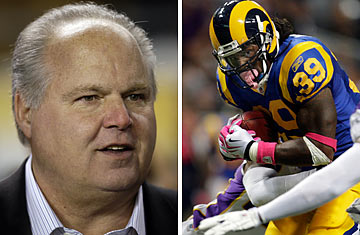
Rush Limbaugh, left, and St. Louis Rams running back Steven Jackson in a game against the Minnesota Vikings on Oct. 11, 2009
You can understand why some NFL players are disinclined to work for Rush Limbaugh, should he become a co-owner of the St. Louis Rams. The conservative yakmonster has openly wished for the nation's first black President to fail — which won't endear him to a league dominated by black athletes who probably don't share that sentiment about President Obama. Nor does the country that elected him. And as a commentator for ESPN in 2003, Limbaugh made a racist remark that quickly got him benched: he disparaged Donovan McNabb, arguing that the Philadelphia Eagles QB got higher marks than deserved because of his color. Philadelphia fans were outraged — mostly at being accused of grading anyone on a curve. In Philly, nobody but nobody gets a pass, except the wideouts.
So should Rush Limbaugh be deemed unfit to be an NFL owner because he's said things that some people deem racist? Sadly, the league's historical precedent does not exclude such behavior. As Sports Illustrated just pointed out, the former Washington Redskins owner George Preston Marshall was an open racist who kept the Redskins white, not to mention inept — now there's an accomplishment — until 1962, long after the owners grudgingly reintegrated the league in 1946.
No current NFL owner is crazy enough to engage in the racially charged polemics that Limbaugh does, whether regarding voter turnout, affirmative action or whatever else the Republican Party's white wing — oops, my bad — right wing wants to attack politically. That's his job as a conservative talk-show host, and he does it really well — well enough to earn the dough needed to own a piece of an NFL franchise. The fact that he is a lawbreaking former drug addict whom the cops discovered copping OxyContin in Palm Beach after years of calling for illegal drug users to go to jail might not boost his candidacy for the owners club. (It could qualify him to play in the NFL, though, which leads the sporting world in felonies.)
The very idea, though, that the collection of NFL owners is some kind of football Kiwanis Club is crazy in the first place. Civic good? NFL owners have a dedicated interest in going wherever civic leaders are good enough to shower them with money. Remember the Irsays, who owned the Baltimore Colts? They slunk out of Baltimore in the middle of the night for the riches of Indianapolis. Now Jim Irsay, owner of the Indianapolis Colts, is saying he couldn't even think of voting for Limbaugh. The man has his standards. And let's not forget former Cleveland Browns owner Art Modell, who abandoned a down-on-its-luck city that worshipped his team for ... Baltimore. The Adams family bid farewell to Houston — Love ya, Blue, bye-bye — for Nashville. The Bidwells, formerly of St. Louis, now winter with their Arizona Cardinals while the Rosenbloom family that is selling its piece of the St. Louis Rams used to call Los Angeles home. Meanwhile, won't Oakland Raiders owner Al Davis, long his own best friend and adviser, move his dysfunctional 0-5 team anywhere for the right amount of money? (Oakland fans may also consider paying him to leave.) More recently, teams such as the Dallas Cowboys, the New York Giants and the New York Jets have held up hard-pressed state and local governments for money to build stadiums where they can gouge their fans with $20,000 seat-licensing fees. So loyalty isn't really big in the NFL, though self-indulgence, a Rush specialty, certainly is.
Several outstanding NFL players, including McNabb and Jets linebacker Bart Scott have announced they wouldn't play for a Limbaugh-owned team. That's understandable, but they shouldn't forget that playing in the NFL is to be working for sport's biggest plantation. Yes, guys like McNabb are making multimillion-dollar paydays. Yet he and the rest of the players labor within the confines of a football monopoly that has never taken kindly to outside competition or an activist workforce. Consider the NFL players' strike of 1987, which the owners crushed with all the sensitivity of Kentucky coal-mine operators. In ensuing labor agreements, the owners not only imposed a salary cap but also made most of the players indentured servants. In the NFL there are two positions: stars and parts. Teams discard broken parts, which is why the average playing career is just a couple of years, leaving behind hundreds of wrecked bodies. Once a player become less useful, his contract, like his bones, can be broken.
So sure, maybe Rush isn't the players' dream boss, nor is he even favored by other owners, including Jim Irsay. But the notion that you need to occupy some kind of moral high ground to be able to extract profit from a monopoly sport that routinely exploits its criminally inclined workforce leaves me unmoved. The NFL is just another big business — why should it be anything less — only with a huge amount of ego attached to it. Rush should fit in quite well.
